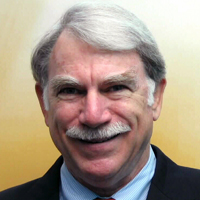Annulée / Canceled
Alan Marshall, Ph.D.
Professor, Chief Scientist for Ion Cyclotron Resonance (ICR) and Robert O. Lawton Distinguished Professor of Chemistry
CIMAR, ICR
21 Tesla Fourier Transform Ion Cyclotron Resonance Mass Spectrometry: Performance Benchmarks and Applications
Abstract
Alan G. Marshall, Lissa C. Anderson, Greg T. Blakney, Martha L. Chacon-Patiño, John P. Quinn, Karl W. Smith, Chad R. Weisbrod, Ryan P. Rodgers, Christopher L. Hendrickson
Ion Cyclotron Resonance Program, National High Magnetic Field Laboratory, 1800 E. Paul Dirac Drive, Tallahassee, FL 32310 U.S.A.
FT-ICR MS offers the highest broadband mass resolution and mass accuracy. FT-ICR mass resolving power varies directly with applied magnetic field strength (NHMFL’s 21 tesla offers the world’s highest field for ICR). FT-ICR MS is uniquely advantageous for resolution and assignment of elemental compositions for complex mixtures, ranging from petroleum crude oil (>125,000 assigned peaks in a single mass spectrum) to top-down proteomics. Benchmark performance will be illustrated for applications ranging from environmental oil spills to diagnostic identification of proteoforms in multiple myeloma and hemoglobinopathies. [Work performed at the National High Magnetic Field Laboratory, supported by NSF Division of Chemistry through DMR-1157490 and DMR-1644779 and the State of Florida.]
Biosketch
Alan G. Marshall completed his B.A. degree with Honors in Chemistry at Northwestern U. in 1965, and his Ph.D. in Physical Chemistry from Stanford U. in 1970. He joined the Chemistry faculty at the University of British Columbia (Vancouver, Canada) in 1969. He moved to Ohio State University in 1980 as Professor of Chemistry and Biochemistry and Director of the Campus Chemical Instrument Center. In 1993, he moved to Florida State University, where he is Robert O. Lawton Professor of Chemistry and Biochemistry and Founding Director and Chief Scientist of the Ion Cyclotron Resonance (ICR) Program, a National Science Foundation user facility for mass spectrometry.
He co-invented and leads the continuing development of Fourier transform ICR mass spectrometry. His current research spans FT-ICR instrumentation development, fossil fuels and environmental analysis, and mapping the primary and higher-order structures of biological macromolecules and their complexes.
Alan’s major recognitions include:
- Eni Frontiers in Hydrocarbon Research Award
- Fellow, American Academy of Arts & Sciences
- Fellow, National Academy of Inventors
- Fellow, American Physical Society
- Felllow, American Association for the Advancement of Science
- Inaugural Fellow, Society for Applied Spectroscopy
- Inaugral Fellow American Chemical Society
- American Chemical Society Award for Chemical Instrumentation
- American Chemical Society Field-Franklin Award
- American Chemical Society Analytical Chemistry Award
- Spectroscopy Society of Pittsburgh Hasler Award
- Spectroscopy Society of Pittsburgh Spectroscopy Award
- Spectroscopy Society of Pittsburgh Analytical Chemistry Award
- American Society for Mass Spectrometry Distinguished Contribution Award
- International Society for Mass Spectrometry Thomson Medal
- American Institute of Chemists Chemical Pioneer Award
- Association of Biomolecular Research Facilities Award
- American Chemical Society New York Section William H. Nichols Medal
Marshall is a former President of the American Society for Mass Spectrometry, and serves on several editorial boards. He has published 5 books, 7 patents, and 654 refereed journal articles, and has authored more than 2100 talks/posters at conferences, universities, government labs, and industry. According to Google Scholar, Marshall’s papers have been cited more than 54,000 times, with a Hirsch number of 120. Of his 154 former Ph.D.’s and postdocs, 37 have gone on to academic positions, and the others to positions in major industrial and government laboratories
Date
Date(s) - January 11, 2022
12:00 pm - 1:00 pm
Emplacement / Location
ZOOM

